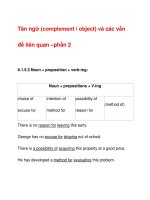English Object complement
Bạn đang xem bản rút gọn của tài liệu. Xem và tải ngay bản đầy đủ của tài liệu tại đây (12.35 KB, 1 trang )
Object complement
Study the sentence given below. Does it make complete sense?
They elected Martin.
While this sentence has a subject, a verb and an object, it does not make complete sense. We understand that
Martin has been elected, but we don’t know what position he occupies. In this case, we need a word or phrase to
complete the meaning of the object.
They elected Martin
their president.
Here the noun ‘their president’ acts as the object complement.
More examples are given below.
They named the boy Christopher. (Subject – they; verb – named; object – the boy; object complement –
Christopher)
Here the noun ‘Christopher’ completes what is said about the object ‘the boy’ and hence it acts as the object
complement.
More examples are given below.
James calls his dog
Tiger
. (Subject – James; verb – calls; object – his dog; object complement – Tiger)
The members elected Mathews
their president
. (Subject – the members; verb – elected; object –
Mathews; object complement – their president)
The minister made his nephew
his private secretary
. (Object complement – his private secretary)
The king named his youngest son
his successor.
The object complement can also be an adjective or an adjective phrase.
My reply made my father
angry
. (Subject – my reply; verb – made; object – my father; object complement
– angry)
The manager kept the clerks always
busy
. (Object complement – always busy)
The teachers considered the boy
very bright
. (Object complement – very bright)
The judge found the accused
guilty
. (Object complement – guilty)
He proved them
wrong.
(Object complement – wrong)
Be first to know when grammar rules change! Sign up to our newsletter here: englishgrammar.org (It's free)
Powered by TCPDF (www.tcpdf.org)









